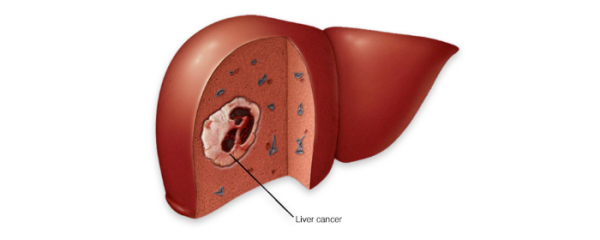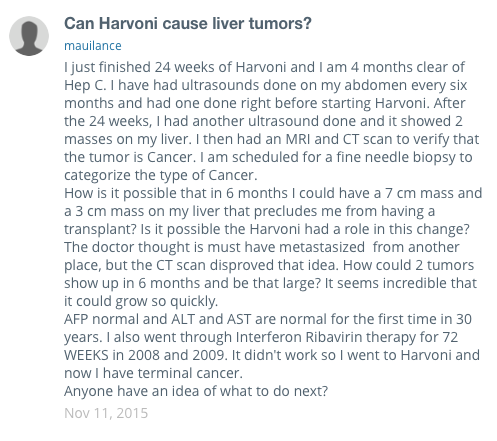Huge liver cancer found just weeks after successful Hep C treatment

You probably have already heard about the new antiviral hep C drug, which is effective but insanely expensive. It claims to have around 90% success rate, that’s why so many hepatitis C patients are dying for it even though it’s extremely costly. But apart from its expensive price tag, there is a bigger issue behind this new drug that not many people know about. Scientists and researchers have found an increased risk of extreme liver cancer related to this new drug after successful treatment. [1]
7 cm cancer tumor developed in just 6 months
Hep C patient first hand experience: “I just finished 24 weeks of Harvoni and I am 4 months clear of Hep C. I have had ultrasounds done on my abdomen every six months and had one done right before starting Harvoni. After the 24 weeks, I had another ultrasound done and it showed 2 masses on my liver. I then had an MRI and CT scan to verify that the tumor is Cancer. I am scheduled for a fine needle biopsy to categorize the type of Cancer.
How is it possible that in 6 months I could have a 7 cm mass and a 3 cm mass on my liver that precludes me from having a transplant? Is it possible the Harvoni had a role in this change?
The doctor thought is must have metastasized from another place, but the CT scan disproved that idea. How could 2 tumors show up in 6 months and be that large? It seems incredible that it could grow so quickly.” [2]
Research findings at EASL
We are now seeing extreme growth of liver cancer cases after treatment with direct acting antiviral. This matches the findings of a research published at the the International Liver Congress held by EASL, in which Dr Brillianti mentioned:
"Patients with previous hepatocellular carcinoma are, of course, at risk of recurrence anyway,” and “A 30% rate over 3 years from initial surgery or ablation is normal. What was surprising to us was that we were observing 4 cm lesions after 12 weeks.” [3]
What’s more, in April 2016, data from a study regarding the risk of liver cancer (hepatocellular carcinoma) coming back in patients who were treated with these drugs became available. The study suggested that these patients were at risk of their cancer coming back earlier than patients with hepatitis C who were not treated with direct-acting antivirals. This further reinforces the findings.
Irresponsible reply from doctors
One of YHK’s users has sadly been diagnosed of liver cancer due to the same reason above. He is a long term user who has hepatitis C, and for many years he has been able to keep it under control with the help of YHK. His ALT and AST levels were completely normal, but a free trial offer and the thought of being cured led him to make the decision to go for the new treatment and thus stopped using YHK.
After 12 weeks of treatment, he was cured as he had hoped, but within 3 months liver cancer was discovered. When he asked his doctor why this had happened, the reply was shocking. His doctor simply said that “the drug is only designed to eliminate the viruses.” He was understandably mad at the result and more so at his irresponsible doctor and his poor attitude.
Doctors rarely admit that problems arise from the drugs they recommended, on the other hand, it is hard for patients to prove such claims. But recent research has suggested that this is the case, these antiviral drugs do increase the risk of extreme liver cancer. Dr Brillianti said,
“The hypothesis is that immune surveillance may be reduced too rapidly,” and “You have an immediate drop in viremia, but also attenuation of inflammation.” [3]
Long term protection and monitoring
No doubt that a cure for hep C is ideal, but after paying such a large sum of money, there is still a bigger price that you might need to pay behind this so-called perfect solution. In view of this, we must focus more on post treatment (liver function/ cirrhosis) recovery, liver cancer prevention, and monitor the liver’s condition regularly.
We must understand that our aim is to recover normal healthy liver function and this can only be achieved by enhancing the growth of liver cells and preventing the development of cancer cells. Virus or no, NORMAL LIVER FUNCTION is the key.
It is not too late to start protecting your liver now. If you are in similar situation and worry about developing liver cancer, please contact our support team, we are here to make your liver stronger!

- Risk of their cancer coming back earlier than patients with hepatitis C who were not treated with direct-acting antivirals http://www.ema.europa.eu/ema/index.jsp?curl=pages/news_and_events/news/2016/04/news_detail_002509.jsp&mid=WC0b01ac058004d5c1 (Access: 2016-09-22)
- 7 cm mass and a 3 cm cancer in 6 months http://www.medhelp.org/posts/Cirrhosis-of-the-Liver/Can-Harvoni-cause-liver-tumors/show/2785560 (Access: 2016-09-22)
- Development of hepatocellular carcinoma in hcv cirrhotic patients treated with direct acting antivirals. http://www.medscape.com/viewarticle/862041 (Accessed: 2016-04-20)
- * All research and clinical data should be used as reference purposes only, results may vary.






